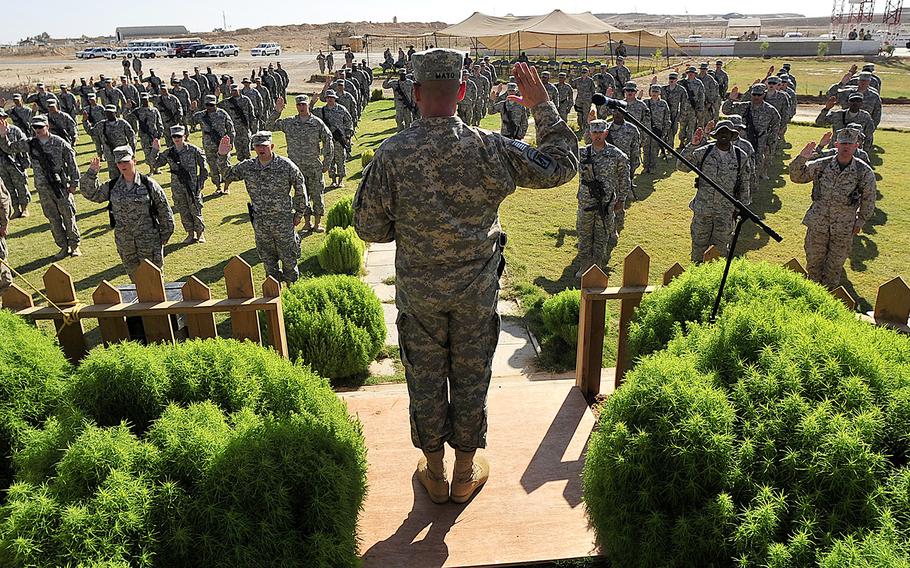
With hands raised, 126 U.S. servicemembers rehearse prior to a mass re-enlistment ceremony at Al Asad Air Base, Iraq, Oct. 5, 2011. (U.S. Air Force)
WASHINGTON — Critics say the Air Force is using a recent regulation that requires the phrase “so help me God” in a re-enlistment oath to keep a nonbelieving airman from continuing to serve.
Monica Miller, an attorney for the American Humanist Association, said the airman, stationed at Creech Air Force Base, Nevada, was prevented from re-enlisting last month because he objected to the phrase, which he crossed out on a re-enlistment contract.
In a letter to the Air Force Inspector General and commanders and other personnel at Creech, Miller wrote that Supreme Court and lower court decisions over decades clearly rule out forcing government personnel to call on a deity in order to be sworn into a job.
Should the Air Force persist in requiring the airman to take a religious oath, the AHA is prepared to sue individual commanders involved in enforcing the regulation, said Miller, who works for the AHA’s Appignani Humanist Legal Center.
“The question is so well settled that they should be held personally liable for applying this requirement unconstitutionally,” she said in an interview.
The airman has chosen to remain anonymous to avoid retaliation from members of the military or the public scornful of his decision, Miller said.
Until last year, the Air Force instruction on re-enlistment allowed airmen to opt out of religious affirmations in the oath. According to an instruction enacted in May 2011, “Airmen may omit the words ‘So help me God’, if desired for personal reasons.”
In October 2013, however, the instruction was revised to remove the opt-out clause. Air Force officials at the Pentagon said Friday they were still looking into the situation at Creech, but said the new instruction is based on the requirements of federal law.
“Reciting ‘So help me God’ in the re-enlistment and commissioning oaths is a statutory requirement under Title 10 U.S.C. §502,” Air Force spokeswoman Rose Richeson said in a written statement. “Air Force Instruction 36-2606, Reenlistment In the United States Air Force, is consistent with the language mandated in 10 U.S.C. §502.
“Paragraph 5.6 was changed in October 2013 to reflect the aforementioned statutory requirement and Airmen are no longer authorized to omit the words ‘So help me God.’”
But a military legal expert said the Air Force was far off base in its interpretation, and predicted the regulation would be quickly upended if the unnamed airman sues.
“I am confident this action would be overturned by a federal court,” Eugene Fidell, a former president of the National Institute of Military Justice who teaches military law at Yale, said in an email to Stars and Stripes. “What amazes me is that the Air Force would be tone-deaf to a direct constitutional prohibition. The affected airman should sue. Then it will be up to the Justice Department to decide whether it wishes to defend this blatantly unconstitutional requirement.”
Regardless of what Air Force officials believe, there is no requirement to enforce a clearly unconstitutional regulation, Fidell said.
“They don’t have to wait for a court ruling,” he said, “to comply with the constitutional prohibition, by which all federal officials are bound.”
Military law expert Chris Jenks, assistant law professor and head of the Criminal Justice Center of the Dedman School of Law at Southern Methodist University, said the Air Force currently has the letter of the law on its side. But should the service dig in its heels and go to court, he said the federal statute containing the enlistment language could well be found unconstitutional.
Although “so help me God” is traditional in oaths of office, the military also has a history of accommodating those with other religious beliefs, or none, he said.
“For instance, a court-martial witness taking the stand can swear or they can affirm,” said Jenks, who served as an Army prosecutor. “If they swear, they end their oath with 'so help me God,' but if they affirm, they do not have to take an oath or end it with 'so help me God.'”
Jenks said the Air Force — which has faced criticism over the years from those who say Christian conservatives hold too much sway — stands out among the services for the amount of religious controversy it generates.
“The Air Force can’t seem to get out of bed in the morning without stepping in, causing or creating some religious freedom issue or other,” he said.
carroll.chris@stripes.com Twitter: @ChrisCarroll_